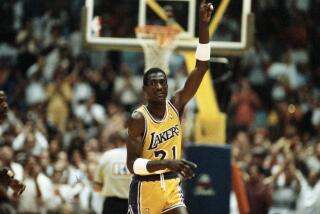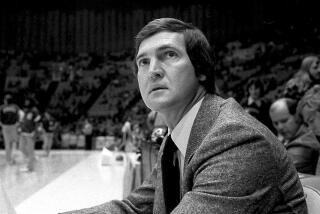Being Among First Blacks in NBA Just Didn’t Pay for Clifton
- Share via
CHICAGO — Nat (Sweetwater) Clifton walked through the doors closed to blacks and across the hot coals of National Basketball Assn. floors 40 years ago, blazing a trail that few of today’s young, basketball-playing millionaires would recognize.
He was jeered in St. Louis, segregated from teammates and shunted to second-class hotels in Baltimore and Indianapolis, and sometimes denied the ball by his own teammates in New York and Detroit.
But he loved basketball enough to endure without complaining then, and recalling those days as he eases his brand new Yellow Cab into noon-hour traffic on Chicago’s wide, winter-gray boulevards, he is not about to begin complaining now.
Even though securing their futures--the Michael Jordans, the Magic Johnsons--did precious little to guarantee his own.
“The guys from our time weren’t exactly promised a pension,” Clifton recalled during a recent interview, “but there was a sort of feeling, ‘Keep your mouth shut, you’ll be taken care of somehow or other.’
“Looking back, maybe we should have spoken up,” he said. “But I figure I’ve been a lucky man, lucky enough to work at something I loved to do and lucky enough to see places most people never get to--Europe, South America, the Far East.
“And quite honestly, I don’t worry about it (a pension) anymore. You wake up bitter every morning, pretty soon you’re carrying around more than your mind can handle.
“I’d like to be 24 again and playing today,” he said. “But that’s the way life is.”
In fact, Clifton left the NBA in 1959 after eight seasons with the Knicks and a ninth with the Pistons, averaging 10 points and 9 rebounds a game.
But the league’s pension plan--which provides a 10-year player, after he reaches 50, about $15,000 a year for life--doesn’t cover those who retired before the 1964-65 season.
“I never saw Nat Clifton play, but I heard plenty about him,” said Jordan, Chicago Bulls guard.
“The fact that there wasn’t a benefit plan in place back then is no excuse, because players like Clifton paved the way not only for blacks, but for white ballplayers as well,” he added.
“Justice ought to be served. Players like Nat Clifton should get some kind of reward for making the NBA what it is today. Without the guys like him, guys like me would not be getting what they are getting,” Jordan said.
Clifton, who is 6 feet 6 inches, now weighs 55 pounds more than when he played at 235.
But through the rear-view mirror of his taxi, one can still see the competitive fires glowing in those sleepy eyes. And his massive hands, even draped over a steering wheel, look as strong as they must have been on opening night in 1950, when he made his NBA debut.
Clifton was the first black signed by an NBA team after Ned Irish, founding father of the Knicks, scouted him playing for the Harlem Globetrotters and bought his contract from Globetrotter owner Abe Saperstein.
But Duquesne’s Chuck Cooper actually became the first black to play in the NBA because Cooper’s Boston Celtics opened the season the night before.
“I’ve got pictures of me and a few of the other (black) ballplayers from those early years--Earl Lloyd, Davage Minor, Don Barksdale--and some of them claim they were playing that first year,” Clifton said. “But the best I remember, it was just Chuck and I.”
Two previous seasons with the Globetrotters had taught Clifton to handle playing in front of crowds, especially hostile ones, and he had remarkably few run-ins with opposing players.
During those early Globetrotter years, his fondness for soft drinks--”I never drank whiskey or nothing like that,” he said--earned him the nickname “Sweetwater.”
Clifton made his NBA reputation as a rebounding forward and center, and he became a defensive specialist out of necessity, as well as by design.
“I could score. I was an offensive player with the Globies and at Xavier,” he said, referring to the all-black university he attended in Louisiana. “But in the NBA, because I was big and strong, I started getting matched against guys like (George) Mikan, Dolph Schayes, Bob Petit and (Easy) Ed McCauley.
“Besides, there weren’t any plays for me. Being the only black on the team, I always figured the reason I didn’t get the ball more is because the other fellows were looking out for themselves . . . figuring what they were going to do to stick with the team,” Clifton said.
One of Clifton’s rare flourishes, a between-the-legs dribbling maneuver, led to his one and only NBA fight after Boston’s Bob Harris took exception and the two exchanged words.
“Sweets hit him and knocked him out cold,” Vince Boryla, a former teammate who later became general manager of the Nuggets and now lives in semi-retirement in the Denver area, told the Chicago Tribune.
“The whole Boston bench jumps up and starts out onto the court and Sweets turns around with his hands up, like he’s saying, ‘Come on,’ ” Boryla said. “They all stopped like they hit a glass wall.”
The trade to Detroit sent Clifton to the bench for the first time in his professional career. He left the NBA in 1959, returned to the Globetrotters and settled back in Chicago to care for his mother, who was left speechless by a stroke.
After injuring a knee in 1960, Clifton began driving a cab to make ends meet. The knee never healed enough that he could compete again.
He slips into Chicago Stadium for nearly every Bulls’ game, but sits up in the rafters to avoid notice. The club has invited him to attend All-Star Game ceremonies Feb. 7 as a guest, but he said he still hasn’t decided whether he will go.
“Anybody could use help financially, but I’m a happy man,” he said. “I like driving the cab, I’m good at it, and it’s a living.”
A group of former players, led by Schayes and Gene Conley, have petitioned to be included in the pension plan covered by the next collective bargaining agreement, and both representatives of the NBA and the players association say there is a strong likelihood the issue will be given serious consideration when talks resume.
The last three-year agreement expired in June, and the two sides haven’t sat down at the bargaining table since September.
“I don’t think about the pension, I figure the newer owners, and the players can’t be expected to help somebody they didn’t know.
“But,” he concludes, “they ought to remember there were other people in the world before they came into it.”
More to Read
Go beyond the scoreboard
Get the latest on L.A.'s teams in the daily Sports Report newsletter.
You may occasionally receive promotional content from the Los Angeles Times.










